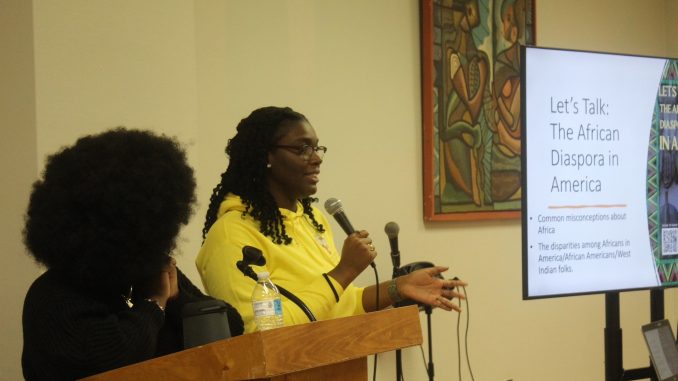
By Kate Dempsey
“Did you not live in a house? Did you grow up poor?” These are some of the questions that immigrant students from Africa face in their daily lives. Many are part of the first generation to be fully born in the United States, with several going back to their family’s home country to visit. Many misconceptions about African students continue today and are perpetuated by bleak images in the media that omit the diverse and rich lived experiences of people from all over the African continent.
To clear up the stereotypes, the African Student Union held “The African Diaspora in America” on Wednesday, Feb. 8, where participants played “African Family Feud,” a twist on the classic game show with questions based around different cultures in Africa.
“We want to be able to speak about those misconceptions and why do we think this way, going back to colonization, de-colonization, the relationships that the African continent has with the Western world or the people who had colonized them,” said Fatoumata Soumahoro, president of the African Student Union. “We want to speak more about those things because we didn’t really get those lessons in history class.”
When asking the crowd how many have seen commercials of poor people in Africa, everyone raised their hand. When asked about commercials featuring the rich and middle class of Africa, nobody raised their hand. Beyond their socioeconomic status, students who come from the African continent or speak African languages such as Xhosa and Yoruba, often face bullying and discrimination, according to the event’s participants and organizers. The rich range of African languages is also often erased with questions like “Do you speak African?” ASU’s e-board alone has four members, whose respective families speak different languages descending from different countries.
“It really just depends on where you are. It’s like you were to approach a European and ask them ‘Do you speak European?’ In the continent of Europe, they speak French, they speak Italian, they speak Spanish, they speak English,” said Ari Turay, vice-president of ASU.
The event comes at a time when several states in the U.S. seek to ban teachings of diversity and race in schools. In recent news, Florida representatives and Governor Ron DeSantis banned elements in the Advanced Placement African American Studies course after an initial draft was released. According to the New York Times, the final course released on Feb. 1, the first day of Black History Month, removed topics such as Black Lives Matter, Black queer life, the debate over reparations, and incarceration. Authors who have written about these topics such as Angela Y. Davis, Ta-Nehisi Coates, and Kimberlé W. Crenshaw have also been removed. The removal, ASU explained at the event, is due to a suppression of the true history of the United States, creating a separation between historical injustices and the current issues stemming from them.
“When you truthfully look at the history of the United States specifically, they’re [European descendants] not the good guys,” explained Turay. “The way for us to not have history repeat itself is by knowing our history. We are all in college, we are grateful enough that we do have the Africana department and we do have that Africana studies, but these are classes that we can personally go and take ourselves.”
Through their “African Family Feud,” ASU leaders intended to start educating participants about African culture in a fun and engaging way. Some of the game show questions included, “What is an African parent’s favorite word to call their kid?,” “What is the worst thing to happen at an African wedding?,” and “Name something you would bring on an African safari.”
For Brooklyn College students, one does not need to have African heritage to enjoy and learn about the diaspora.
“One thing we would like all students on campus to know is that they are all welcome to the African Student Union, even though we are centered around Africa and African students,” said Wisdom Obadofin, secretary of ASU. “We are a place that welcomes all people.”
